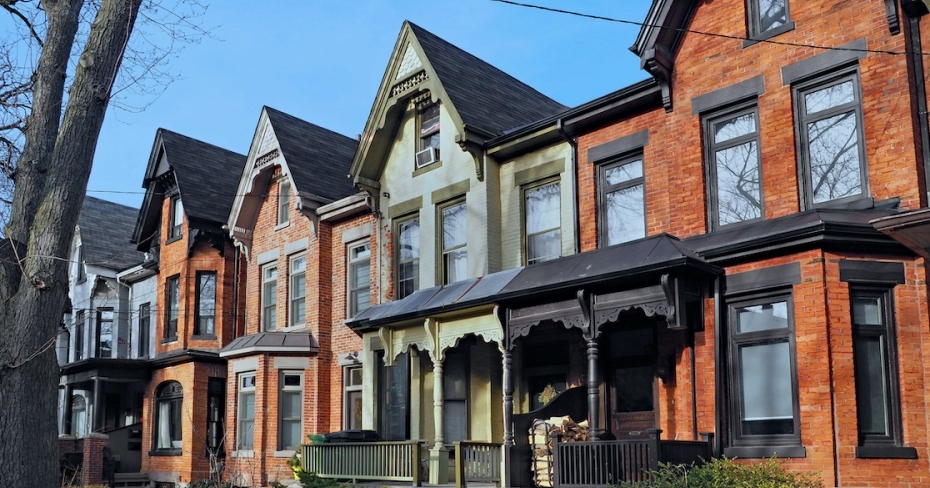What income do you need to afford a $1-million house in Toronto?

Is owning a house in Toronto even possible anymore? Well, the reality is, it depends on how much you make. We break down exactly what salary you have to take home to afford a $1-million house in the Big Smoke.
This article has been updated from a previous version.
Oh, Toronto housing.
Until recent years, hopeful homebuyers in Toronto would often start their housing journey by scooping up a starter home. In many cases, they could get a single-detached home with a few bedrooms and a spacious backyard.
But then, due to demand and a host of other reasons that everyone is still trying to understand, detached home prices shot up to a realm that is wholly unaffordable for most. While many once wondered what income is needed for an 800K mortgage in Canada, the average house in Toronto now sits slightly north of $1 million.
So, are your dreams of owning your own house over? Well, it depends on how much you make. Below, we break down exactly what salary you have to take home to afford a 1-million dollar house in Toronto.
The breakdown
Home price: $1,000,000
Down payment: $200,000, or 20% (in Canada, homebuyers are required to make a minimum 20% down payment for homes worth $1,000,000 or more)
Mortgage loan insurance: $0 (when you put down a down payment of 20% or more, you do not have to buy mortgage loan insurance from the Canada Mortgage and Housing Corporation)
Amortization period: 30 years (the maximum amount of time your lender will give you to pay off your loan)
Payment frequency: Monthly
Note: our calculations don’t take maintenance fees into account, which is a cost you’ll have to take on if you buy a condo.
It’s also important to know that under the B-20 rules, lenders must stress test all buyers to ensure they can afford to pay their mortgages if interest rates rise (those renewing their mortgage have to do a stress test only if they change lenders). The stress test requires you to show you can handle rates at the five-year Bank of Canada benchmark rate (5.25%) or two percentage points above the rate you qualified for (whichever one is higher).
Now, let’s break down what salary you need to afford that 1-million dollar home.
If you go with a fixed-rate mortgage
When you get a fixed-rate mortgage, your interest rate on the mortgage will stay the same throughout the length of each payment term — which, in this case, spans five years.
In Canada, you can only get a 25-year amortization period (the length of time you have to pay off your mortgage) on insured mortgages. However, because you need to put down 20% on a home worth $1 million or more, that allows you to stretch your amortization to 30 years because the mortgage is not insured.
Based on these details, we’ve come up with the number below using the LowestRates.ca mortgage calculator.
Mortgage rate: 2.64%
Mortgage term: Five years
Amortization period: 30 years
Mortgage: $3,213/month
Property taxes: $6,110.13/year, or $509.18/month (we used the City of Toronto’s property tax calculator)
Utilities: $100
Monthly payment once you qualify: $3,822.18/month, or $45,866.16/year
If you go with a variable-rate mortgage
A variable-rate mortgage moves with market interest rates. This means that the interest rate you’ll be paying on your mortgage will fluctuate depending on how the market moves — you could either end up paying less than you would with a fixed-rate mortgage, or you could end up paying more.
Mortgage rate: 1.25%
Mortgage term: Five years
Amortization period: 30 years
Mortgage: $2,665/month
Property taxes: $6,110.30/year, or $509.18/month
Utilities: $100
Monthly payment once you qualify: $3,274.18/month, or $39,290.16/year
Passing the mortgage stress test
Whether your mortgage is insured or uninsured, you’ll have to undergo a stress test to ensure you can afford the mortgage. Currently, the benchmark rate is 5.25%. That means homebuyers must prove they can afford a mortgage in addition to utilities and other costs if interest rates rise.
Most brokers will also consider your Gross Debt Service ratio (GDS) and Total Debt Service Ratio (TDS), which can be no more than 39% and 44%, respectively.
The GDS is the percentage of household income covering housing costs, including mortgage and property taxes. The TDS is the percentage of household income covering housing costs and any other debts, including credit cards and car payments.
Mortgage rate: 5.25%
Mortgage term: Five years
Amortization period: 30 years
Mortgage: $4,390/month
Property taxes: $6,110.13/year, or $509.18/month
Utilities: $100
Total: $4,999.18/month, or $59,990.16/year
Based on these numbers, you need to make at least $155,500 before taxes to pass the stress test and finance a $1-million home with either a variable- or fixed-rate mortgage — assuming you have no additional debts. However, some mortgage lenders have tighter restrictions and may require an income closer to $187,900 to qualify.
Final verdict
To recap, you need to make $155,500 right now to qualify for a mortgage on a $1-million home in Toronto.
The median household income for the Toronto region is $78,373, according to the 2016 Census — Statistics Canada will release new data mid-year in 2022. Nevertheless, homebuyers need to make double that to qualify for a mortgage for the average house in the city.
Of course, the home purchase price isn’t the only expense to consider. Additional fees include closing costs like lawyer fees and land transfer tax, of which Toronto has two: municipal and provincial. Understanding all the associated costs of buying a home can ensure a smooth homebuying process.
About the author

Jessica Mach is a freelance writer for LowestRates.ca. She's covered the documentary film industry at realscreen, and her work has also appeared in The Hairpin.


